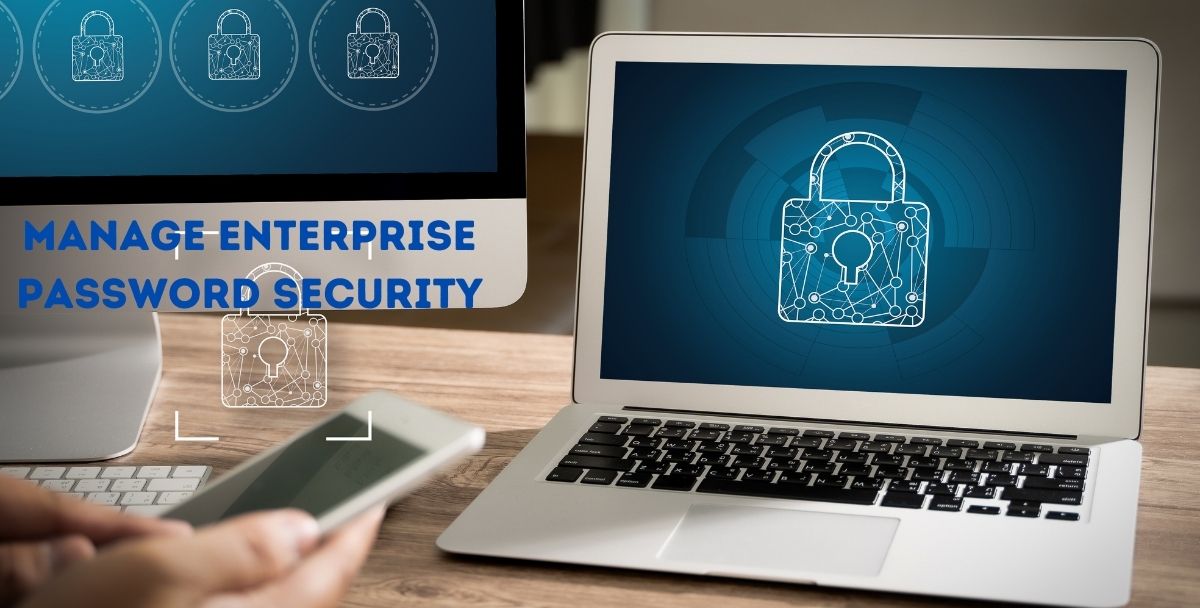How to Manage Enterprise Password Security

The majority of data breaches for businesses today are ultimately the result of poor password management. Even with companies aware of the danger of password mismanagement, many companies still find that their employees are not practising quality password hygiene. If you feel that your password security needs help, here are a few tips to get you started.
Stop Using Easily Guessed Passwords
The means by which hackers obtain our data are becoming increasingly more complex (though older methods, such as phishing, are still commonly used). But even with the ever-growing list of threats against your company, employees are still using simple and predictable passwords. Not even Fortune 500 companies are immune to the dangers of weak passwords that can be cracked in less than a second.
While it’s tempting to use the name of your pet, your favorite sports team, or even your spouse, it’s important to refrain from doing this. Anything that a hacker can find on your social media accounts should not be used in your passwords. And if you’re using any of the most commonly used passwords, head to your accounts and change them immediately.
Don’t Recycle Your Passwords
Though it may seem obvious to avoid using the same password for every account, doing so is an incredibly common practice. Considering that the average person can have nearly 100 password-protected accounts, it’s hard to blame people for using one password for every account. But for employees who utilize the same passwords for both work and personal accounts, this greatly increases the chance of their personal data being compromised. Though it takes extra effort, creating a unique password for each account is well worth the extra security.
Eliminate Password Sharing
The practice of sharing passwords with your coworkers sounds ridiculous when you first hear it. But for many employees, password sharing is not only common, it’s expected. For many workers collaborating on projects together, sharing passwords is reportedly the most common way to share files with coworkers. Several employees have reportedly even shared their passwords with managers and executives.
But one password in the wrong hands can lead to very costly consequences for your company. These problems are multiplied further if that password is used for an employee’s personal account, such as a bank account. If information is to be shared, it should be done in the most discreet way possible, preferably without sharing passwords.
Keep Your Passwords Securely Stored
There are those who take the time to create unique passwords, but those passwords may be at risk due to improper storage. It’s very common for employees to store passwords in an unencrypted file on their work computer, where any hacker in the company’s system can access those passwords. Others take to more tangible means of storage, writing down their passwords in a notebook (or the dreaded sticky note, where any passerby can see it). Some may even recommend the notebook as it can’t be compromised in a data breach. But there are more efficient, more modern methods for storing your passwords.
Utilize a Password Manager
Password managers are steadily becoming a standard part of modern cybersecurity. The habit of creating, maintaining, memorizing, and changing numerous passwords can be incredibly stressful for some people. But password managers make it incredibly easy for companies to empower their employees to practice efficient password hygiene.
All of the aforementioned problems can be easily solved by implementing enterprise password management solutions. Rather than forcing employees to rack their brains creating brand new passwords for every new account, the password manager can automatically generate a strong, unique password for each account. And every new password is stored in the employee’s personal password vault, eliminating the need to memorize the new password.
But the password vault is for so much more than passwords. Any data files you have can be stored in your password vault. And for ease of use, your IT department can establish shared file folders through the password manager. This allows you to quickly and discreetly share those files with any coworkers, preserving your password security without slowing down your workflow.
Despite all the modern features, there are those who are apprehensive about using a password manager, wondering how their passwords are truly secure if they’re all in one place. One common feature of most password managers is the use of zero-knowledge encryption. When a new password is created and stored in the vault, the password manager automatically encrypts the password. This ensures that your passwords cannot be read by the manager, giving you the absolute most secure password storage available.
Be Diligent with Your Security Practices
Even with a password manager implemented, employees and managers should stay diligent. While password managers are incredibly useful and secure tools, they can still be hacked if not properly secured. Employees should always use a strong master password. It is also of the utmost importance to change group passwords when an employee leaves the company, and to have the IT department keep the software updated.
